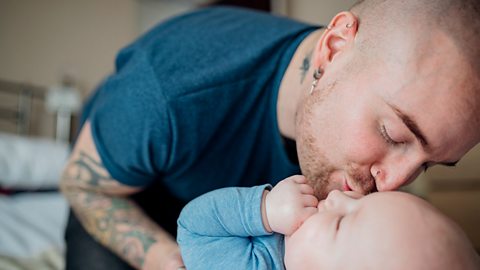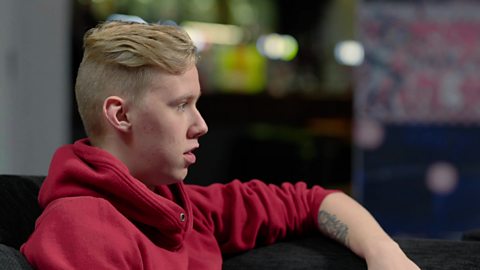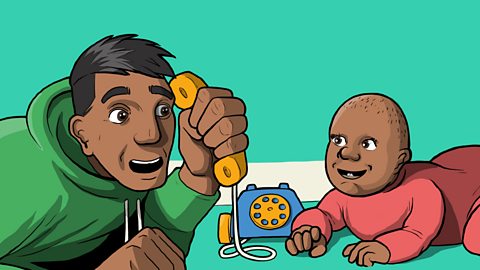When women become mums, they go through a lot of obvious biological changes. But did you realise that menâs bodies change when they become dads too?
âThe only thing Iâve noticed physically is putting a load of weight on, Iâm getting a bit of a dad bod!â says Tom, dad to 6 month-old Otis.
But no, we donât just mean putting on a few extra pounds. âMum and dad are as biologically primed to parent as each otherâ, says Dr Anna Machin, author of The Life of Dad: The Making of the Modern Father. âThatâs the big new understanding about parenthood â in the past we thought only women underwent bodily changes, mainly as a product of pregnancy and childbirth, but actually men go through similar things tooâ.
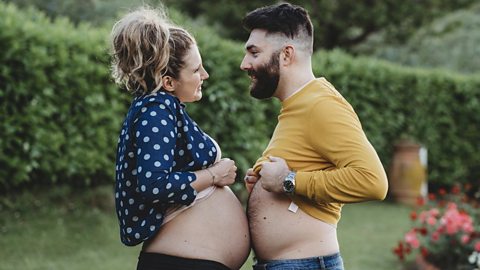
Ok, so men donât carry babies for 9 months, give birth or produce milk. But they do go through some changes that arenât obvious to the naked eye. âThere are two major changes that happen, generally the first time you become a dad: hormonal changes and brain changesâ, explains Dr Anna.
Mum and dad are as biologically primed to parent as each other.
Hormonal highs and lows
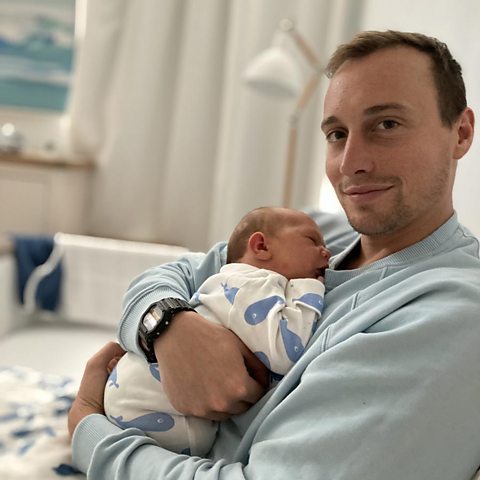
The main hormonal change is a drop in testosterone, the male sex hormone. âTestosterone is great when youâre in the mating/dating game because it makes you more competitive, more motivated to look for a mateâ, says Anna.
But when you become a dad, this drop is one way your body prepares you for your new role.
âMen with lower testosterone are much more sensitive towards their children and empathetic. It makes them motivated to care for their child. If you were to play baby cries to a group of men, those with really high testosterone would probably find it really irritating whereas men with low testosterone would become anxiousâ.
This rings true for Mark, who recently became a dad for the first time. âIâve been around my baby nephew crying and Iâd be like âcan someone sort this out?â. The minute itâs your baby, you know when a cry is something you can sort out yourselfâ.
Drops in testosterone also make dad more patient too, which is helpful with a baby or toddler. âIâve not felt frustrated in any way. I was in the car the other day and someone was taking ages to get out of a spot, but I was like, âwhateverâ. Things like that just arenât a big deal any moreâ, says Mark.

A drop in testosterone comes with a major pay-off for dadsâ relationships with their children too. âHigh testosterone levels block the positive effects of oxytocin and dopamineâ, says Anna â two of the major chemicals involved in bonding with your baby. Theyâre produced when you cuddle and interact and give you that warm, fuzzy feeling. âBecause your testosterone is low when youâre a new dad, the impact of oxytocin and dopamine is much greater, so you will enjoy chatting and playing much moreâ.
Tom has been experiencing this rush regularly, âwhen heâs laughing, thereâs no better feeling, reallyâ.
Itâs not all good news though, Anna warns. âTestosterone is protective against low mood. So a drop, when coupled with high risk factors like work-life balance, a partner going through or issues with bonding can increase the likelihood of male postnatal depressionâ.
Knowing more about your hormones and their effects could help you be more aware of your mental wellbeing, says Anna. âAs a woman, you can think: âI know this is probably my hormones speaking, I know thereâs a hormonal element to feeling this crapâ, which can sometimes help. For men, knowing how hormonal changes could also leave you vulnerable to something like PND, will hopefully nudge you to keep an eye on your own mental healthâ.
Mutual benefits for dad and baby
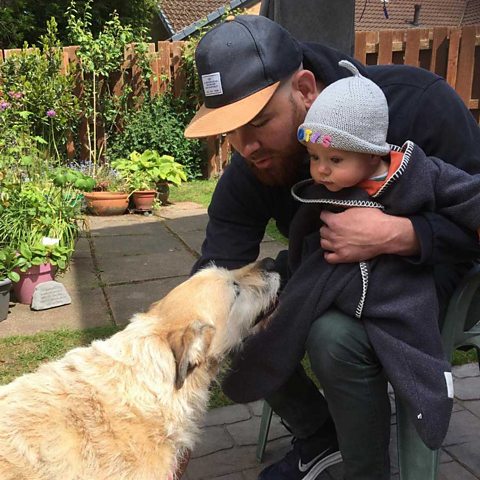
Children also experience the same rush of dopamine and oxytocin as dads through cuddling and playing. So from early on, dads can start building bonds through touch, hugs, skin-to-skin contact and massage. However, the biggest rushes of oxytocin come as baby grows and the relationship with dad becomes even more interactive.
âIf a dad asks me âwhatâs the one thing I can do to bond with my child?â, Iâll say âplay with themâââ, Anna tells us. âWhatâs fascinating is thereâs been this coevolution between dads and babies. They both get their biggest peak of oxytocin when they play togetherâ.
Now that he and Otis are able to play together regularly, Tomâs mum has spotted something. âShe reckons heâs got a different laugh for me than he has for his mum. When I play with him, I move him around and Iâm a bit more physical. And I do the same things every time, the things that I know will work to make him laughâ.

This sort of rough and tumble play is common with dads and something that Anna says is crucial to childrenâs development. âNot only does it give your child a massive hit of oxytocin but it teaches them how to deal with risks and challenges, how to fail and pick themselves up, dust themselves off and carry on. And children who have engaged in this sort of play tend to be more physically and emotionally resilient and have better mental health as they get olderâ.
Anna is keen to stress that dadsâ role as a playmate is therefore key. âIn the past, being termed âthe fun parentâ might have seemed like a put-down for dads, but play is actually really important for your childâs developmentâ.
If a dad asks me âwhatâs the one thing I can do to bond with my child?â, Iâll say âplay with themâ.
Positive brain changes
As well as changes in hormone levels, when you become a dad, your brain physically changes too.
âWe see changes in those areas which we need to be able to parent wellâ, says Anna. âSo, for example, in the outer brain we see increases in areas needed for skills such as planning, focussing without distraction and problem solving. In the unconscious brain, we see activity in areas related to nurturing and risk detection, which are needed to know your baby is safeâ.
The latter is something that Tom has definitely experienced first-hand. âYouâre just worrying all the time. Definitely more than before. If Iâm walking down the road, Iâll look behind me when cars are coming to see if theyâre randomly going to veer off the road towards me whenever Iâve got the baby!â.
As well as being more risk-aware, dads often become more sensitive, particularly when it comes to children. âYou become much more empathetic to othersâ painâ, says Anna. âMany dads I speak to will say âI canât watch news reports about children any more, I just become this heap of tears and blubberââ. Tomâs been feeling this too, particularly when watching the Âé¶čÔŒĆÄâs Life and Birth series. âIt brings me to tears. It wouldnât have affected me before, but now it really doesâ.
We see increases in areas needed for skills such as planning, focussing without distraction and problem solving.
Knowledge is power
Anna is hopeful that by being clued up on their biology, men will gain confidence in their instincts as a dad.
âWhat I tend to hear a lot from men before they become parents is that mum is the gold standard of parenting. She instinctively knows what to do because sheâs gone through pregnancy, childbirth and breastfeeding, whereas men have to learn. Thatâs not true. Women and men are just as instinctive as parents as each other, because theyâre both biologically primed to do itâ.
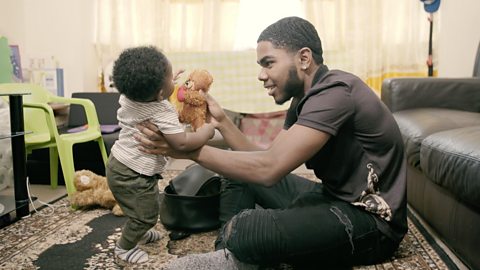
She has some words of advice for dads: âYour instincts are there, you just have to be confident that theyâre there. Try to see yourself as the equal co-parent rather than the assistant parent who is there to learn on the jobâ.
- For plenty of play ideas, visit our Activities section.

